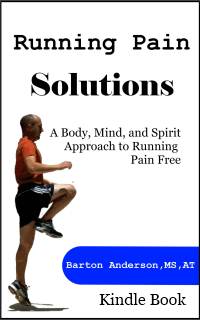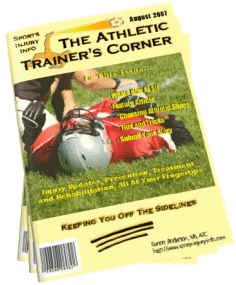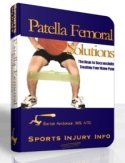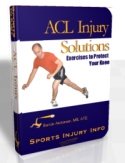Meniscus Tear Symptoms: What To Look For...
Meniscus tear symptoms are not quite as specific as the symptoms of a torn acl, however, there are many things that you should be looking for if you think you may have torn your meniscus. Below you will find the most common meniscus tear symptoms.Swelling
Swelling is one of the most common symptoms of a torn meniscus. A meniscus tear involves damage to the meniscus, or cartilage of the knee. Since this cartilage is within the knee joint, swelling that occurs with a meniscus tear is confined within the joint. This means that your entire knee will swell, often quite a bit.Your knee will feel very tight, and will look visibly larger than your uninjured knee. When put side by side, you will be able to tell if it is swollen.
Many people describe it looking like a grapefruit - large and puffy. Your knee cap may dissappear. This type of swelling is called an effusion, because it is contained within the joint.
A
meniscus
tear will usually swell very slowly, usually over the first 24-48 hours. This
is important to know when you talk to your physician, because it helps
to differentiate your injury from other types of knee injuries during
evaluation.
Although swelling is common with
meniscus tears, it varies
quite a bit among different injuries. I have seen several patients
with meniscus tears who experienced no swelling, or very little
swelling. More information about meniscus tear swelling
Pain
Another meniscus tear symptom is pain. Pain is usually rated as mild to moderate, 2-7 on a 10 point scale. It is usually sharp at first, and then may become throbbing or achey as your knee begins to swell.Trying to straighten or bend your knee often increases pain, and this is especially true after your knee swells up. Although pain is common, you can have a meniscus tear without experiencing pain. But chances are if you don't have pain you probably won't notice your tear very quickly.
More information about meniscus tear pain
Clicking, Catching, Popping
Following a meniscus tear, you may experience popping or clicking in your knee when you bend and straighten it. The meniscus sits directly between the femur and the tibia, and if there is a tear, this disrupts the normal movement of the bones. Depending on the tear, and its placement within the joint, it may pop or click when you bend the knee, or you may feel like your knee catches and needs to pop. This is a very common menicus tear symptom.Loss of Range of Motion
Because a meniscus tear may cause swelling, you will most likely lose range of motion in your knee. You may have trouble bending it, often unable to bend to 90 degrees. It may also be difficult to completely straighten it out.More information about meniscus tear loss of motion
Loss of Strength
Because of the swelling and injury to the knee, your quadriceps muscles may be inhibited by the body in order to try to protect the injury. This means that you will have trouble lifting your leg, or straightening it out, both because of pain, and a feeling of weakness.Summary
A meniscus tear may be hard to diagnose on a clinical exam. This is true if you have few of the symptoms above. However, if you do suffer from some of the meniscus tear symptoms above, you should see your family physcian for evaluation. Popping, catching, clicking, pain, swelling, loss of range of motion, and loss of strength are the most commonly seen meniscus tear symptoms.Didn't find what you were looking for? Search SII for more information...
Running Pain Solutions
Written for Runners by a runner, you'll learn a holistic approach to improving mobility, restoring normal movement and muscle activation patterns, and restoring the body and mind connection.
This Kindle Book contains a step by step program to keep you running pain free. Included are detailed instructions and illustrations for exercises to improve mobility, balance, neuromuscular control, strength and endurance. Only $7.49!
Get Your Copy Today!









